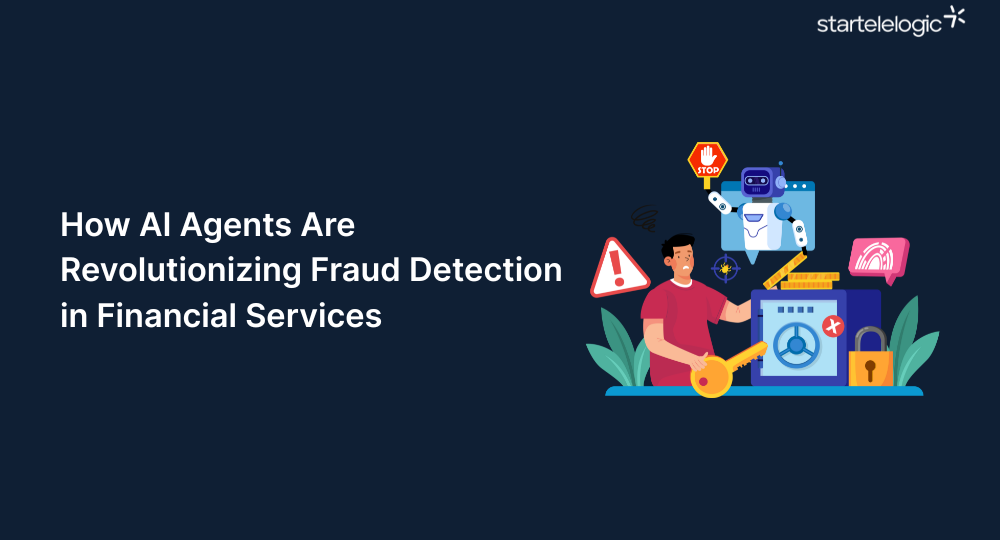The financial services industry is witnessing a paradigm shift with the integration of Artificial Intelligence (AI) agents into fraud detection systems. According to a report by Statista, global losses due to payment card fraud alone are projected to reach $49.32 billion by 2030, up from $28.58 billion in 2022. This alarming growth underscores the urgent need for advanced solutions capable of combating increasingly sophisticated fraudulent activities. Enter AI Agent in Fraud Detection—a game-changing technology that is transforming how banks, insurance companies, and other financial institutions safeguard their operations.
The Growing Challenge of Fraud in Financial Services
Fraudulent activities have become more complex and frequent as cybercriminals leverage cutting-edge tools like deepfake technology, social engineering, and automated bots to bypass traditional security measures. A study conducted by McKinsey found that nearly 75% of financial institutions reported an increase in fraud attempts during the pandemic. With digital transactions surging post-COVID-19, legacy fraud detection methods relying on rule-based algorithms struggle to keep pace with these evolving threats.
Traditional approaches often rely on predefined rules or signatures to identify anomalies, which can result in high false-positive rates and missed detections. For instance, if a customer makes an unusually large purchase abroad, it might trigger a flag even though the transaction could be legitimate. Such inefficiencies not only frustrate customers but also expose organizations to significant risks.
This is where AI Agent in Fraud Detection steps in, offering unparalleled precision, adaptability, and scalability.
What Are AI Agents?
AI agents are intelligent software systems designed to perform specific tasks autonomously using machine learning (ML), natural language processing (NLP), and predictive analytics. Unlike static rule-based systems, AI agents continuously learn from new data inputs, enabling them to detect patterns and anomalies in real time. When applied to fraud detection, these agents act as proactive guardians, analyzing vast amounts of structured and unstructured data to identify suspicious behavior before any damage occurs.
Key Features of AI Agents in Fraud Detection:
- Real-Time Monitoring: AI agents analyze transactions instantly, flagging potential fraud within milliseconds.
- Behavioral Analysis: By studying user behavior over time, AI agents can differentiate between normal and abnormal activity.
- Adaptive Learning: These agents improve their accuracy through continuous feedback loops, adapting to emerging fraud tactics.
- Cross-Channel Integration: They monitor multiple channels simultaneously, including online banking, mobile apps, ATMs, and point-of-sale terminals.
How AI Agents Enhance Fraud Detection
1. Advanced Pattern Recognition
One of the standout capabilities of AI Agent in Fraud Detection is its ability to recognize subtle patterns that humans or conventional systems might overlook. Using unsupervised machine learning techniques, AI agents can cluster similar transactions and pinpoint outliers without needing explicit instructions. For example, they can identify unusual spikes in account logins from different geographic locations or detect irregularities in spending habits.
2. Predictive Analytics for Proactive Measures
Predictive analytics allows AI agents to forecast potential fraud based on historical trends and current behaviors. For instance, if a customer suddenly starts making small test purchases followed by larger ones—a common tactic used in credit card fraud—the system will raise an alert before significant losses occur. This predictive capability empowers financial institutions to take preemptive action rather than reacting after the fact.
3. Natural Language Processing for Enhanced Insights
NLP enables AI agents to process textual data such as emails, chat logs, and social media posts to uncover signs of phishing scams or insider threats. For example, an AI agent might analyze employee communications to detect discussions about bypassing internal controls, thereby preventing collusion-related fraud.
4. Reducing False Positives
High false-positive rates are a major pain point for financial institutions, leading to unnecessary investigations and strained customer relationships. AI agents address this issue by incorporating contextual information into their decision-making processes. For instance, if a flagged transaction involves a trusted merchant or aligns with a verified travel itinerary, the system may classify it as low-risk, reducing unnecessary alerts.
Real-World Applications of AI Agents in Fraud Detection
Several leading financial institutions have already embraced AI Agent in Fraud Detection, achieving remarkable results:
Case Study: JPMorgan Chase
JPMorgan Chase implemented an AI-powered platform called COiN (Contract Intelligence) to review legal documents and extract critical data points. While initially focused on contract analysis, the bank extended the platform’s capabilities to fraud detection, resulting in a 90% reduction in manual reviews and faster identification of fraudulent claims.
Case Study: PayPal
PayPal leverages AI agents to combat payment fraud across its global network. Their system analyzes millions of transactions daily, identifying suspicious activities with an accuracy rate exceeding 95%. As a result, PayPal has maintained trust among its 400+ million users while minimizing revenue loss due to fraud.
Benefits of AI Agents in Fraud Detection
- Cost Efficiency: Automating fraud detection reduces operational costs associated with manual monitoring and investigation.
- Improved Accuracy: AI agents minimize errors and ensure more reliable outcomes compared to human analysts.
- Scalability: These systems can handle massive datasets and scale effortlessly as transaction volumes grow.
- Customer Satisfaction: By reducing false positives and streamlining authentication processes, AI agents enhance the overall customer experience.
- Regulatory Compliance: Many jurisdictions require financial institutions to implement robust anti-fraud measures. AI agents help meet these regulatory demands efficiently.
Challenges and Ethical Considerations
While the adoption of AI Agent in Fraud Detection offers numerous advantages, it also presents challenges:
- Data Privacy Concerns: Collecting and analyzing sensitive customer data raises questions about privacy and consent.
- Bias in Algorithms: If not properly trained, AI agents may inadvertently perpetuate biases present in historical data.
- Cybersecurity Risks: Hackers targeting AI systems themselves pose a new threat vector that must be addressed.
To mitigate these concerns, financial institutions must prioritize transparency, ethical AI practices, and robust cybersecurity protocols when deploying AI agents.
The Future of AI Agents in Fraud Detection
As AI technology continues to evolve, we can expect even more sophisticated applications in fraud detection. Some emerging trends include:
- Explainable AI (XAI): Providing clear explanations for AI-driven decisions to build trust and accountability.
- Federated Learning: Allowing AI agents to learn collaboratively across institutions without sharing sensitive data.
- Quantum Computing: Enhancing computational power to solve highly complex fraud detection problems at unprecedented speeds.
Conclusion
The role of AI Agent in Fraud Detection cannot be overstated in today’s fast-paced financial landscape. By combining real-time monitoring, predictive analytics, and adaptive learning, these intelligent systems offer unparalleled protection against ever-evolving fraud schemes. As evidenced by successful implementations at companies like JPMorgan Chase and PayPal, AI agents are proving to be indispensable allies in safeguarding assets and maintaining customer trust.
For financial institutions looking to stay ahead of the curve, embracing AI-driven fraud detection is no longer optional—it’s essential. With continued advancements in AI technology, the future holds immense promise for creating safer, smarter, and more resilient financial ecosystems.
By leveraging the power of AI Agent in Fraud Detection, businesses can not only mitigate risks but also unlock new opportunities for innovation and growth. The question isn’t whether you should adopt AI agents—it’s how soon you can integrate them into your operations.




